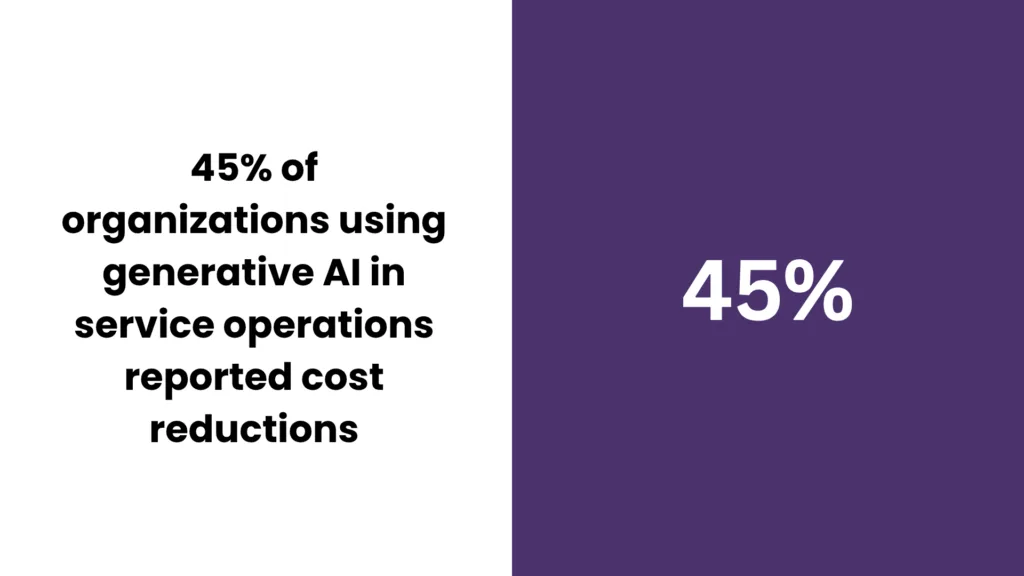Explore the revolutionary impact of AI in customer service – from chatbots to predictive analytics. Uncover benefits, real-world applications, and implementation strategies for business success.
Let’s face it.
Most “game-changing” technologies fizzle out before you can spell “apple”.
So when AI in customer service came around, many execs shrugged.
“Just another chatbot,” they said.
But here’s the kicker:
Companies that embraced it now report 87% faster resolutions, 35% cost savings, and customer satisfaction surging by double digits.
So, what was different this time around?
Turns out, AI didn’t just automate support. it reinvented it.
And in this blog, we’ll show you how. Check out the top 5 benefits of AI in customer service; along with some real life success stories to attest to them.
Get. Set. Goooo!
Understanding the Foundation: What is AI in Customer Service?
AI in customer service refers to the deployment of intelligent AI technologies that can understand, process, and respond to customer needs without constant human intervention.
In fact, AI can now handle up to 95% of customer interactions. These are mostly routine queries – like FAQs, password resets, and order updates.
The beauty of AI lies in its versatility and adaptability.
AI Customer support systems don’t just respond to queries; they anticipate needs, personalize interactions, and create seamless experiences that build customer loyalty and drive business growth.
Let’s consider the case of a typical customer journey to understand this in detail.
The AI CS system immediately recognizes the customer through:
- voice patterns or account credentials,
- analyzes their interaction history to understand context,
- processes their current request against a vast database of similar scenarios,
- and delivers a solution tailored to their specific situation and communication preferences.
All of this happens in seconds.
And sure enough, it creates an experience that feels both efficient and surprisingly human.
This technological evolution in CS marks a departure from the traditional view of support as a cost center.
Instead, AI transforms customer service into a strategic asset that drives revenue, improves customer retention, and provides valuable insights for business growth.
But how does this AI customer service differ from the traditional way of handling CS?
Let’s get into that too.
But how does traditional CS differ from AI in Customer Service?
On surface, this does not seem like a big deal.
And trust us, we get it.
Every other technology today is touted to be revolutionary or game-changing.
But AI in customer service just might stand true to its word.
What sets AI apart from traditional automation is its ability to learn and adapt. Where older systems followed rigid scripts and decision trees, AI systems can understand context, recognize patterns, and improve their responses based on previous interactions.
At its core, AI in customer service represents a paradigm shift from reactive problem-solving to proactive customer engagement.

You see, traditional customer service models often struggled with three fundamental limitations:
- Scalability (handling large volumes of simultaneous requests)
- Consistency (maintaining service quality across all interactions)
- Availability (providing support outside business hours).
AI addresses these limitations by creating systems that can learn from vast amounts of data, recognize patterns in customer behavior, and deliver solutions that improve with each interaction.
As noted in various studies, AI systems can promptly address typical customer concerns while continuously learning and evolving to handle increasingly complex scenarios.
In fact, McKinsey’s report shows that over 80% of companies are either already using or planning to adopt generative AI for customer interactions
This learning capability means that an AI system deployed today will be significantly more capable 6 months from now.
This is after having processed thousands or millions of customer interactions and refined its understanding of how to best serve each unique situation.
5 Key Benefits of AI in Customer Service
The Efficiency Revolution That Never Sleeps
Did you know the story of Maria?
She’s a small business owner who sells handcrafted jewelry online.
Before implementing AI, Maria spent hours each day answering the same questions about shipping policies, return procedures, and product care instructions. Customer inquiries would pile up overnight, and international customers often waited days for responses due to time zone differences. Today, her AI-powered customer service system handles 80% of these routine inquiries instantly, allowing her to focus on creating new designs while her customers receive immediate, accurate responses 24/7.
The dawn of AI in customer service has ushered in an era of unprecedented efficiency and customer satisfaction. Organizations implementing AI solutions are discovering benefits that extend far beyond simple automation, creating value that resonates throughout their entire business ecosystem.
#Benefit 1: AI Customer Support Enhances Efficiency and Productivity
The most immediate and measurable benefit of AI in customer service is the dramatic improvement in operational efficiency.
AI-powered systems can handle multiple customer inquiries simultaneously.
This would require an army of human agents to accomplish.
In fact, AI significantly reduces response times while maintaining consistent service. Lyft, for instance, integrated Anthropic’s Claude AI via Amazon Bedrock. The result? An 87% drop in average resolution time, with thousands of cases handled daily.
This 24/7 availability means customers no longer face the limitation of business hours.
Businesses can serve their international customer base without the prohibitive costs of maintaining round-the-clock human staff across multiple time zones.
The efficiency gains extend far beyond mere availability.
AI systems eliminate the repetitive tasks that often burden human agents, such as answering frequently asked questions about business hours, return policies, or account balances.
By automating these routine interactions, organizations can redirect their human resources toward more complex, high-value activities that require emotional intelligence and creative problem-solving.
IBM Studies show that AI in customer service report cost reductions of up to 30% while simultaneously improving customer satisfaction scores.
This help orgs reallocate resources to create more value for both customers and the business
#Benefit 2: AI provides superior customer experience and Personalization
71% percent of consumers only engage with companies that deliver personalized interactions.
However, traditional customer service often treated personalization as a luxury.
~ONLY available only to high-value customers or premium service tiers.
AI democratizes personalization.
It makes it possible to deliver tailored experiences to every customer interaction.

By analyzing vast amounts of data including:
- purchase history
- browsing behavior
- previous interactions,
- and even communication preferences
AI creates a comprehensive understanding of each customer’s unique needs and preferences.
This deep insight enables businesses to offer tailored recommendations, anticipate problems before they arise, and provide solutions that feel uniquely crafted for each individual.
The personalization capabilities of AI extend to real-time through sentiment analysis.
This allows CS systems can detect customer emotions through text or voice interactions and adjust their responses accordingly.
So if a customer appears frustrated, the AI can:
- Expedite their connection to a human agent
- Offer more empathetic language
- Or proactively provide additional resources to resolve their concern.
This emotional intelligence, combined with data-driven insights, creates experiences that feel both efficient and genuinely caring.
The sophistication of AI personalization extends to predictive recommendations and proactive engagement.
By analyzing behavioral patterns, purchase history, and even seasonal trends, AI can anticipate what a customer might need next and present relevant options before they even ask.
This might manifest as suggesting complementary products, offering timely maintenance reminders for purchased items, or providing helpful resources based on recent activities.
For example, a customer who purchased a high-end camera might receive personalized tutorials on advanced photography techniques, invitations to exclusive photography webinars, or early access to compatible accessories.
The result intuitive and thoughtful customer experience.
#Benefit 3: AI Customer Service is Scalable
Traditional customer service presented businesses with a challenging dilemma:
How to handle growth in customer demand without proportionally increasing costs or compromising service quality.
AI, thankfully, provides an elegant solution to this age-old challenge.
AI provides unparalleled scalability for customer service operations.
During peak seasons like Black Friday, product launches, or unexpected surges in demand due to viral social media mentions, AI systems can instantly scale to handle increased volume without the need for emergency hiring, overtime costs, or service degradation.
This flexibility ensures consistent service quality regardless of demand fluctuations, protecting both customer satisfaction and operational budgets.
In fact, Salesforce reports reveal that 86% of service teams that use AI report that it helps them scale support operations more effectively.
#Benefit 4: AI Customer Service is Cost-Effective
Customer service operations experience a 35% cost reduction and a 32% revenue increase through AI adoption.

However, beyond reducing labor costs, AI minimizes errors that can lead to costly resolution processes.
This decreases training expenses for routine inquiries, and improves first-contact resolution rates that reduce the need for follow-up interactions.
Organizations report that AI-driven customer service solutions deliver ROI rather quickly. In fact, nearly 90% of CFOs reported very positive ROI on AI within 9 months of implementing it. with ongoing savings that compound over time.
Moreover, the data collected through AI interactions provides valuable insights for product development, marketing strategies, and business optimization.
This creates additional revenue opportunities beyond direct cost savings.
#Benefit 5: It creates a seamless omnichannel experience
Modern customers live in a multi-channel world.
They seamlessly moving between email, chat, phone, social media, mobile apps, and in-person interactions.
In fact, Omnichannel service boosts CSAT to 67%, compared to just 28% for multichannel.
Customers expect their experience to be consistent and continuous across all these touchpoints.
AI ensures these interactions form a cohesive, continuous conversation rather than disconnected fragments that force customers to repeat their stories.
When a customer starts a conversation via chatbot about a billing issue, then later calls the support line because the issue proves more complex, AI ensures the human agent has full context of the previous interaction.
Needless to say, as AI evolves, these benefits will only amplify.
Organizations that embrace AI capabilities today are setting themselves up for sustained competitive advantage.